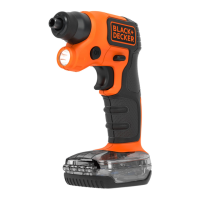ENGLISH
6
Charger Cleaning Instructions
WARNING: Shock hazard. Disconnect the charger
from the AC outlet before cleaning. Dirt and grease
may be removed from the exterior of the charger using
a cloth or soft non-metallic brush. Do not use water or
any cleaningsolutions.
Important Charging Notes
1. Longest life and best performance can be obtained if
the battery pack is charged when the air temperature is
between 65°F and 75°F (18° – 24°C). DO NOT charge
the battery pack in an air temperature below +40°F
(+4.5°C), or above +104°F (+40°C). This is important
and will prevent serious damage to the batterypack.
2. The charger and battery pack may become warm to the
touch while charging. This is a normal condition, and
does not indicate a problem. To facilitate the cooling of
the battery pack after use, avoid placing the charger or
battery pack in a warm environment such as in a metal
shed or an uninsulatedtrailer.
3. If the battery pack does not charge properly:
a. Check operation of receptacle by plugging in a lamp
or other appliance;
b. Check to see if receptacle is connected to a light switch
which turns power off when you turn out the lights;
c. Move the charger and battery pack to a location
where the surrounding air temperature is
approximately 65°F – 75°F (18° – 24°C);
d. If charging problems persist, take the tool, battery
pack and charger to your local servicecenter.
4. The battery pack should be recharged when it fails to
produce sufficient power on jobs which were easily
done previously. DO NOT CONTINUE to use under these
conditions. Follow the charging procedure. You may
also charge a partially used pack whenever you desire
with no adverse effect on the batterypack.
5. Foreign materials of a conductive nature such as, but
not limited to, grinding dust, metal chips, steel wool,
aluminum foil, or any buildup of metallic particles
should be kept away from charger cavities. Always
unplug the charger from the power supply when there
is no battery pack in the cavity. Unplug the charger
before attempting toclean.
6. Do not freeze or immerse the charger in water or any
otherliquid.
Storage Recommendations
1. The best storage place is one that is cool and dry, away
from direct sunlight and excess heat orcold.
2. For long storage, it is recommended to store a fully
charged battery pack in a cool dry place out of the
charger for optimalresults.
NOTE: Battery packs should not be stored completely
depleted of charge. The battery pack will need to be
recharged beforeuse.
SAVE THESE INSTRUCTIONS FOR
FUTURE USE
CHARGING PROCEDURE (FIG. B)
THE BATTERIES IN YOUR TOOL ARE NOT FULLY CHARGED
AT THE FACTORY. BEFORE ATTEMPTING TO CHARGE THEM,
THOROUGHLY READ ALL OF THE SAFETYINSTRUCTIONS.
1. The charger port
6
is keyed to lock out other chargers.
Align the tab in the charger plug
8
with the key in the
chargingport.
2. Plug the charger plug into the charger port of the tool
as shown in figure B.
3. Plug the charger
7
into any standard 120 Volt 60 Hz
electricaloutlet.
4. Your tool should be fully charged in 10 hours from a
fully discharged condition. Recharge discharged
batteries as soon as possible after use or battery life may
be greatly diminished. For longest battery life, do not
discharge batteries fully. It is recommended that the
batteries be recharged after each use or when the LED
work light fails to illuminate or the tools performance
isdiminished.
WARNING: Do not use tool while it is connected to
thecharger.
WARNING: Fire Hazard. When disconnecting the
charger from the tool, be sure to unplug the charger
from the outlet first, then disconnect the charger cord
from thetool.
Fig. B
8
6
INTENDED USE
Your BLACK+DECKER screwdriver is designed for household,
consumer useonly.
DO NOT use under wet conditions or in the
presence of flammable liquids orgases.
DO NOT let children come into contact with the
tool. Supervision is required when inexperienced
operators use thistool.
ASSEMBLY AND ADJUSTMENTS
WARNING: To reduce the risk of serious personal
injury, turn unit off and lock the trigger off
before making any adjustments or removing/
installing attachments or accessories. An
accidental start-up can causeinjury.

